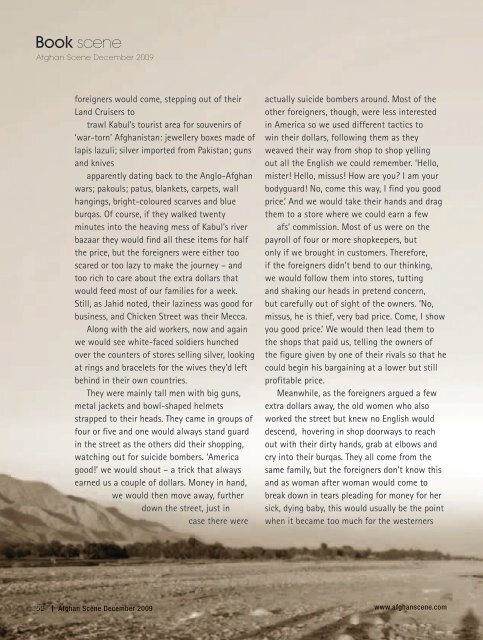Afghanistan's Gem Hunters | Afghan Scene Magazine - Asia-Africa ...
Afghanistan's Gem Hunters | Afghan Scene Magazine - Asia-Africa ...
Afghanistan's Gem Hunters | Afghan Scene Magazine - Asia-Africa ...
You also want an ePaper? Increase the reach of your titles
YUMPU automatically turns print PDFs into web optimized ePapers that Google loves.
scene<strong>Afghan</strong> <strong>Scene</strong> December 2009 scene<strong>Afghan</strong> <strong>Scene</strong> December 2009foreigners would come, stepping out of theirLand Cruisers totrawl Kabul’s tourist area for souvenirs of‘war-torn’ <strong>Afghan</strong>istan: jewellery boxes made oflapis lazuli; silver imported from Pakistan; gunsand knivesapparently dating back to the Anglo-<strong>Afghan</strong>wars; pakouls; patus, blankets, carpets, wallhangings, bright-coloured scarves and blueburqas. Of course, if they walked twentyminutes into the heaving mess of Kabul’s riverbazaar they would find all these items for halfthe price, but the foreigners were either tooscared or too lazy to make the journey – andtoo rich to care about the extra dollars thatwould feed most of our families for a week.Still, as Jahid noted, their laziness was good forbusiness, and Chicken Street was their Mecca.Along with the aid workers, now and againwe would see white-faced soldiers hunchedover the counters of stores selling silver, lookingat rings and bracelets for the wives they’d leftbehind in their own countries.They were mainly tall men with big guns,metal jackets and bowl-shaped helmetsstrapped to their heads. They came in groups offour or five and one would always stand guardin the street as the others did their shopping,watching out for suicide bombers. ‘Americagood!’ we would shout – a trick that alwaysearned us a couple of dollars. Money in hand,we would then move away, furtherdown the street, just incase there wereactually suicide bombers around. Most of theother foreigners, though, were less interestedin America so we used different tactics towin their dollars, following them as theyweaved their way from shop to shop yellingout all the English we could remember. ‘Hello,mister! Hello, missus! How are you? I am yourbodyguard! No, come this way, I find you goodprice.’ And we would take their hands and dragthem to a store where we could earn a fewafs’ commission. Most of us were on thepayroll of four or more shopkeepers, butonly if we brought in customers. Therefore,if the foreigners didn’t bend to our thinking,we would follow them into stores, tuttingand shaking our heads in pretend concern,but carefully out of sight of the owners. ‘No,missus, he is thief, very bad price. Come, I showyou good price.’ We would then lead them tothe shops that paid us, telling the owners ofthe figure given by one of their rivals so that hecould begin his bargaining at a lower but stillprofitable price.Meanwhile, as the foreigners argued a fewextra dollars away, the old women who alsoworked the street but knew no English woulddescend, hovering in shop doorways to reachout with their dirty hands, grab at elbows andcry into their burqas. They all come from thesame family, but the foreigners don’t know thisand as woman after woman would come tobreak down in tears pleading for money for hersick, dying baby, this would usually be the pointwhen it became too much for the westernersand they would climb back into their cars, tryingto avoid our eyes as theirdrivers sped them away from our poverty andback to their privileged lives.However, as the Land Cruisers screeched outof Chicken Street and into the gridlocked trafficof Shahr-e Naw, Spandi would appear to tap hisblackfingers on their windows and hold out thebitter, smoking tin of herbs that we call ‘spand’,the smell of which was so unbelievably foulit was said to chase away evil spirits. Withoutdoubt this was the worst of all our jobs becausethe smoke gets in your hair and your eyesand your chest and you end up looking likedeath. But the money is pretty OK because evenif the tourists aren’t superstitious it’s hard toignore a boy at a car window whose scarredface is the colour of ash.However, on a good day in Chicken Streetwe didn’t need to hustle. The foreign womenwould happily hand over their bags as theystruggled with headscarves they had yet togrow used to, and I would carry their shoppinguntil they called it a day, sometimes earningfive dollars for my trouble. Jamilla wouldsmile prettily and get the same for carryingnothing.‘And what is your name?’ the womenwould ask slowly. Pretty white faces withsmiling red lips. ‘Fawad,’ I would tell them.‘Your English is very good. Do you go toschool?’‘Yes. School. Every day. I like very much.’And it was true, we all went to school –even the girls if their fathers let them – butthe days were short and the holidays longwith months off in the winter and summerwhen it became too cold or too hot tostudy. However, the English we learnt cameonly from the street. It was easy to pick upand the foreigners liked to teach us.And even if Jahid was correct and theydid come to bomb our country and rebuildit again, I quite liked the foreigners withtheir sweaty white faces and fat pockets– which was just as well really, becausethat day I returned to my aunt’s house tobe told we were going to live with three ofthem. Andrea Busfield came to <strong>Afghan</strong>istan in 2001 and left in 2008. A formereditor of <strong>Afghan</strong> <strong>Scene</strong> <strong>Magazine</strong>, she is currently working on her secondnovel, Aphrodite’s War. Born Under a Million Shadows stormed into the UKbestseller list when it was published earlier this year and has already beentranslated into 18 languages. Available on amazon.52<strong>Afghan</strong> <strong>Scene</strong> December 2009www.afghanscene.comwww.afghanscene.com<strong>Afghan</strong> <strong>Scene</strong> December 200953


